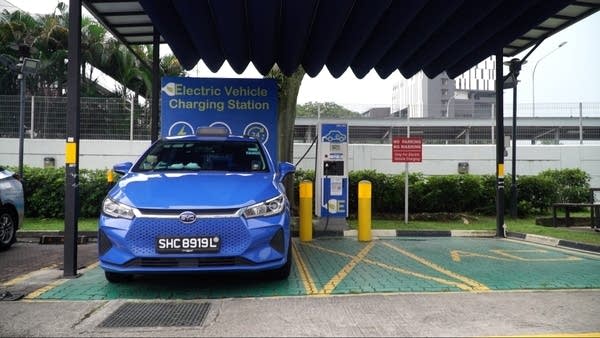Marketplace®
China is home to the world’s largest auto market, and when it comes to electric vehicles, Tesla has dominated sales. But Chinese automaker BYD has recently shaken up the rankings and is now beating out Tesla in the Chinese market while also threatening to push Tesla from its top spot in global EV sales.
BYD stands for Build Your Dreams, and it’s one of the biggest privately owned Chinese companies, but in many places it’s not exactly a household name.
To find out what makes BYD so successful and how its cars perform, ask a taxi driver.
Johnson Foo Chee Keon has driven a cab in Singapore for more than 20 years and said a car radio and space to pack several pieces of luggage are things he values in a vehicle. He’s also particular about the driver’s seat. He’s on the road six days a week on nine-hour shifts. It’s a lot of sitting.
“And you go and sit in another taxi seat, you will know the difference immediately,” Johnson said. He’s been driving a BYD E6 station wagon for around a year and said it’s a smooth ride — so smooth the panda bobblehead that sits on his dashboard hardly moves.
“This ride is fantastic. They don’t have a combustion engine, so it’s very quiet. The drive is very smooth,” Johnson said.
Johnson leases his vehicle from ComfortDelGro, a global transport company that operates 35,000 vehicles in seven countries. Its managing director, Cheng Siak Kian, said BYD’s battery lasts much longer than other cars — especially important when running the air conditioning in the tropical heat.
“We are looking for a vehicle that has got a range of more than 500 kilometers with a single charge,” he said. “And that is something that is front and center in our consideration.”
BYD’s cars are also cheaper than other electric vehicles. Bill Russo, the head of business consultancy firm Automobility in Shanghai, said the price tag is a big part of their appeal.
“The entry price is 78,000 RMB, which is a little more than $11,000,” Russo said.
Tesla’s entry level car, the Model 3, is almost three times as much at $32,000. The U.S. company has slashed prices in China to compete with domestic carmakers. But he said whereas Tesla has outsourced some of its manufacturing, BYD’s is all in house so it has more control over its price.
“BYD was a battery company long before it was a car company,” he said. “They made batteries that went into consumer electronics products and cellphones in particular.”
It’s not just about cost and efficiency. In some places like Singapore, the charging infrastructure is still playing catch up with demand. Cheng Siak Kian from transport company ComfortDelGro said a limited number of fast charging stations are why EVs only make up a small fraction of their fleet.
“If you want them to actually park the vehicle for hours and then wait for the charge, it’s not practical, because for them every hour is actually money.”
It’s not just BYD that Tesla has to worry about. New Chinese EV brands like Nio, XPeng and Li Auto are all revving up their production to join the global race to build electric vehicles.
The Team
- Daisy Palacios Senior Producer
- Daniel Shin Producer
- Jesús Alvarado Associate Producer
- Rosie Hughes Assistant Producer






